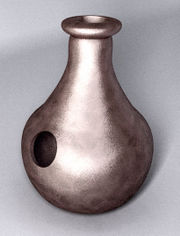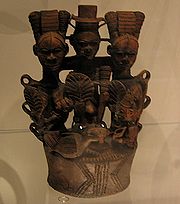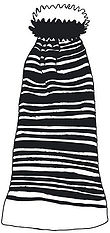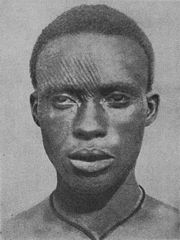
Igbo culture
Encyclopedia

Customs
Customs is an authority or agency in a country responsible for collecting and safeguarding customs duties and for controlling the flow of goods including animals, transports, personal effects and hazardous items in and out of a country...
, practices and traditions of the Igbo people
Igbo people
Igbo people, also referred to as the Ibo, Ebo, Eboans or Heebo are an ethnic group living chiefly in southeastern Nigeria. They speak Igbo, which includes various Igboid languages and dialects; today, a majority of them speak English alongside Igbo as a result of British colonialism...
of southeastern Nigeria
Nigeria
Nigeria , officially the Federal Republic of Nigeria, is a federal constitutional republic comprising 36 states and its Federal Capital Territory, Abuja. The country is located in West Africa and shares land borders with the Republic of Benin in the west, Chad and Cameroon in the east, and Niger in...
. It comprises archaic practices as well as new concepts added into the Igbo culture either by evolution or by outside influence. These customs and traditions include the Igbo people's visual art, music and dance forms, as well as their attire, cuisine and language dialects. Because of their various subgroups, the variety of their culture is heightened further.
Music

Udu
for other uses see Udu The udu is an African drum originated by the Igbo people of Nigeria. In the Igbo language, udu means vessel. Actually being a water jug with an additional hole, it was played by women for ceremonial uses. Usually the udu is made of clay...
, is essentially designed from a clay jug; an ekwe
Ekwe
An Ekwe is an Igbo traditional musical instrument. The ekwe is a type of drum with rectangular cavity slits in the hollowed out wooden interior. The ekwe is made out of wood and most commonly a tree trunk. The ekwe comes in a variety of sizes and designs and each size is determined by the purpose...
, which is formed from a hollowed log; and the ogene
Ogene
Ogene is a style of Igbo music consisting of, and taking its name from, the ogene instrument, which is a large metal bell. The Ogene instrument has historically been made by the Igbo people of Nigeria...
, a hand bell designed from forged iron. Other instruments include opi, a wind instrument similar to the flute, igba
Igba
The igba is a tom-tom that has a beating surface of the same approximate diameter as a bongo. An igba may be as small as 7 inches, or as tall as 3 feet. Traditionally, the deeper shelled igba are played with the hand, while the shorter drums are played with a curved stick. In an ensemble these...
, and ichaka.
Another popular musical form among the Igbo is Highlife
Highlife
Highlife is a musical genre that originated in Ghana in the 1900s and spread to Sierra Leone, Nigeria and other West African countries by 1920...
, which is a fusion of jazz and traditional music and widely popular in West Africa
West Africa
West Africa or Western Africa is the westernmost region of the African continent. Geopolitically, the UN definition of Western Africa includes the following 16 countries and an area of approximately 5 million square km:-Flags of West Africa:...
. The modern Igbo Highlife
Highlife
Highlife is a musical genre that originated in Ghana in the 1900s and spread to Sierra Leone, Nigeria and other West African countries by 1920...
is seen in the works of Prince Nico Mbarga
Prince Nico Mbarga
Prince Nico Mbarga was a highlife musician, born to a Nigerian mother and a Cameroonian father in Abakaliki, Nigeria...
Dr Sir Warrior
Dr Sir Warrior
Christogonus Ezebuiro Obinna , the Ultimate Dr. Sir Warrior, was the leader of the Oriental Brothers International Band which ruled the Nigerian highlife music scene for several decades. He modernized highlife music. His style remains an epitome of defined music with meaning, direction, and purpose...
, Oliver De Coque
Oliver De Coque
Oliver De Coque is a well known name in Nigeria as well as the Nigerian music circle. Though many believe he was not a Nigerian owing to his popular name which has a French leaning, he had started music with Ekpili at the age of 17. Oliver De Coque was from Ezinifite, Nnewi South Local Government...
, Bright Chimezie
Bright Chimezie
Bright Chimezie , also known as Okoro Junior, is a Nigerian highlife musician. His type of music, popularly known as zzigima, became widely available in Nigeria from the early 80s.- References :...
, and Chief Osita Osadebe, who are the some of the greatest Igbo Highlife Musicians of the twentieth century.
There are also other notable Highlife artists of igbo extract, like the Mike Ejeagha, Paulson Kalu, Ali Chukwuma, Ozoemena Nwa Nsugbe.
Art
Igbo Art is known for various types of masqueradeMasquerade ceremony
A masquerade ceremony is a cultural or religious event involving the wearing of masks.Examples include the West African and African Diaspora masquerades, such as Egungun Masquerades, Northern Edo Masquerades, Caribbean Carnival and Jonkonnu.-External links:* - slideshow by Life magazine*...
, masks and outfits symbolising people animals or abstract
Abstract art
Abstract art uses a visual language of form, color and line to create a composition which may exist with a degree of independence from visual references in the world. Western art had been, from the Renaissance up to the middle of the 19th century, underpinned by the logic of perspective and an...
conceptions. Igbo art is also known for its bronze castings found in the town of Igbo Ukwu from the 9th century.
Igbo art is any body of visual art originating from the people of the Igbo.
Mythology
While today many Igbo people are ChristianChristian
A Christian is a person who adheres to Christianity, an Abrahamic, monotheistic religion based on the life and teachings of Jesus of Nazareth as recorded in the Canonical gospels and the letters of the New Testament...
, the traditional ancient Igbo religion is known as Odinani. In the Igbo mythology, which is part of their ancient religion, the supreme God is called Chukwu
Chukwu
Chukwu is the infinitely powerful, undefinable, indefinable, absolute supreme deity encompassing everything in space and space itself, in traditional Igbo spiritual belief system and Igbo mythology. Linguistic studies suggest that the name "Chukwu" is a portmanteau of the Igbo words "Chi" and "Ukwu"...
("great spirit"); Chukwu created the world and everything in it and is associated with all things on Earth. Chukwu is also a solar deity
Solar deity
A solar deity is a sky deity who represents the Sun, or an aspect of it, usually by its perceived power and strength. Solar deities and sun worship can be found throughout most of recorded history in various forms...
. To the ancient Igbo, the Cosmo is divided into four complex parts:
- Okike (Creation)
- Alusi (Supernatural Forces or Deities)
- Mmuo (Spirit)
- Uwa (World)
Alusi

Alusi, also known as Arusi or Arushi, are minor deities
Deity
A deity is a recognized preternatural or supernatural immortal being, who may be thought of as holy, divine, or sacred, held in high regard, and respected by believers....
that are worshiped and served in Igbo mythology
Igbo mythology
Ọdinani, also Ọdinala, Omenala,Omenana, Odinana or Ọmenani is the traditional cultural beliefs and practises of the Igbo people of West Africa...
. There are a list of many different Alusi and each has its own purpose. When there is no longer need for the deity it is discarded.
Yam
The yamYam (vegetable)
Yam is the common name for some species in the genus Dioscorea . These are perennial herbaceous vines cultivated for the consumption of their starchy tubers in Africa, Asia, Latin America and Oceania...
is very important to the Igbo as it is their staple crop. There are celebrations such as the New yam festival which are held for the harvesting of the yam.
The New Yam festival of the Igbo
An annual festival in honor of a good Yam harvest. The festival is practiced in West Africa, in other countries in Africa and beyond.Traditional attire
Traditionally, the attire of the Igbo generally consisted of little clothing as the purpose of clothing then was to conceal private parts, although elders were fully clothed. Children were usually nude from birth till their adolescenceAdolescence
Adolescence is a transitional stage of physical and mental human development generally occurring between puberty and legal adulthood , but largely characterized as beginning and ending with the teenage stage...
(the time when they were considered to have something to hide) but sometimes ornaments such as beads were worn around the waist for medical reasons. Uli
Uli (design)
Uli is the name given to the traditional designs drawn by the Igbo people of Nigeria. Uli drawings are strongly linear and do not have deep perspective; they do, however, balance positive and negative space. Designs are frequently asymmetrical, and are often painted spontaneously...
body art was also used to decorate both men and women in the form of lines forming patterns and shapes on the body.

Western culture
Western culture, sometimes equated with Western civilization or European civilization, refers to cultures of European origin and is used very broadly to refer to a heritage of social norms, ethical values, traditional customs, religious beliefs, political systems, and specific artifacts and...
of Igbo culture, Western styled clothes such as shirts and trousers over took traditional clothing.
Females
Women carried their babies on their backs with a strip of clothing binding the two with a knot at her chest. This baby carrying technique was and still is practiced by many people groups across Africa along with the Igbo who still carry their babies this way. This method has been modernized in the form of the child carrier. In most cases Igbo women did not cover their breast areas. Maidens usually wore a short wrapper with beads around their waist with other ornaments such as necklaces and beads. Both men and women wore wrappers.Males
Males would wear loin cloths that wrapped around their waist and between their legs to be fastened at their back, the type of clothing appropriate for the intense heat as well as jobs such as farming. Men could also tie a wrapper over their loin cloth.Modern traditional attire
Modern Igbo traditional attire is generally made up, for men, of the IsiaguIsiagu
The Isiagu, also called Chieftaincy, is a pullover shirt similar to the dashiki that is worn by Igbo people. It is usually worn on special occasions like weddings. The shirt may be long or short sleeved. Some shirts have gold buttons that are linked by a chain. There is usually a breast pocket...
top which resembles the African Dashiki
Dashiki
The dashiki is a colorful men's garment widely worn in West Africa that covers the top half of the body. It has formal and informal versions and varies from simple draped clothing to fully tailored suits. Traditional female attire is called a caftan, or kaftan...
. Isiagu (or Ishi agu) is usually patterned with lions heads embroidered over the clothing, It can also be plain, (usually black). It is worn with trousers and can be worn with either a traditional title holders hat (a fez named okpu agu or agwu), or with the traditional Igbo stripped men's hat (which resembles the Bobble hat
Bobble hat
A Bobble hat or Bobble cap is a colloquial term for a knit beanie or tuque trimmed with a yarn "bobble" or pom-pom upon the crown. Bobble hats are generally considered utilitarian cold weather wear...
). For women, an embodied puffed sleeve blouse
Blouse
A blouse is a loose-fitting upper garment that was formerly worn by workmen, peasants, artists, women and children. It is typically gathered at the waist so that it hangs loosely over the wearer's body. Today, the word most commonly refers to a woman's shirt but can also refer to a man's shirt if...
(influenced by European attire) along with two wrappers (usually modern Hollandis material) and a head scarf are worn.
Title

Apprenticeship
The Igbo have a unique form of apprenticeshipApprenticeship
Apprenticeship is a system of training a new generation of practitioners of a skill. Apprentices or protégés build their careers from apprenticeships...
in which either a male family member or a community member will spend time (usually in their teens to their adulthood) with a family where they work for them. After the time spent with the family, the head of the household, who is usually the older man that brought the apprentice into his household, will establish the apprentice by either setting up a business for them or giving them money or tools to make a living for themselves.
This practice was exploited by Europe
Europe
Europe is, by convention, one of the world's seven continents. Comprising the westernmost peninsula of Eurasia, Europe is generally 'divided' from Asia to its east by the watershed divides of the Ural and Caucasus Mountains, the Ural River, the Caspian and Black Seas, and the waterways connecting...
ans, who used this practice as a way of trading in enslaved people
Atlantic slave trade
The Atlantic slave trade, also known as the trans-atlantic slave trade, refers to the trade in slaves that took place across the Atlantic ocean from the sixteenth through to the nineteenth centuries...
. Olaudah Equiano
Olaudah Equiano
Olaudah Equiano also known as Gustavus Vassa, was a prominent African involved in the British movement towards the abolition of the slave trade. His autobiography depicted the horrors of slavery and helped influence British lawmakers to abolish the slave trade through the Slave Trade Act of 1807...
, although stolen from his home, was an Igbo person who had similar practice forced on him. He reported that although he was enslaved to an African family he felt part of the family.
Twin killing
Before the rise of ChristianityChristianity
Christianity is a monotheistic religion based on the life and teachings of Jesus as presented in canonical gospels and other New Testament writings...
in Igbo, during the late 19th century and early 20th century, the birth of twins
TWINS
Two Wide-Angle Imaging Neutral-Atom Spectrometers are a pair of NASA instruments aboard two United States National Reconnaissance Office satellites in Molniya orbits. TWINS was designed to provide stereo images of the Earth's ring current. The first instrument, TWINS-1, was launched aboard USA-184...
(and other multiple birth
Multiple birth
A multiple birth occurs when more than one fetus is carried to term in a single pregnancy. Different names for multiple births are used, depending on the number of offspring. Common multiples are two and three, known as twins and triplets...
s) in most parts of Igboland (as well as neighboring groups such as the Ibibio
Ibibio people
The Ibibio are a people of southeastern Nigeria. They are related to the Anaang and the Efik peoples. During colonial period in Nigeria, the Ibibio Union asked for recognition by the British as a sovereign nation . The Annang, Efik, Ekid, Oron and Ibeno share personal names, culture, and traditions...
) was seen as an abomination
Evil
Evil is the violation of, or intent to violate, some moral code. Evil is usually seen as the dualistic opposite of good. Definitions of evil vary along with analysis of its root motive causes, however general actions commonly considered evil include: conscious and deliberate wrongdoing,...
. Multiple birth
Multiple birth
A multiple birth occurs when more than one fetus is carried to term in a single pregnancy. Different names for multiple births are used, depending on the number of offspring. Common multiples are two and three, known as twins and triplets...
s were believed to be only what animals should produce and single births were believed to be what only humans should produce. The reason behind this belief may have been the result of limited obstetrical knowledge.
Twins were killed by abandonment in the community's evil forest or in some cases were instantly killed. After the birth, the mother of the twins went through cleansing rituals to purify her from the abomination.
The practice of twin killing among the Igbo has long since died.
Osu caste system
Osu are a group of people whose ancestors were dedicated to serving in shrines and temples for the deities of the Igbo, and therefore were deemed property of the gods. Relationships and sometimes interactions with Osu were (and to this day, still are) in many cases, forbidden.To this day being called an Osu remains a stigma that prevents people's progress and lifestyles.
Calendar (Iguafo Igbo)
In the traditional Igbo calendar, a week has 4 days (Eke, Orie, Afọ, Nkwọ), seven weeks make one month , a month has 28 days and there are 13 months in a year. In the last month, an extra day is added. The names of the days have their roots in the mythology of the Kingdom of NriKingdom of Nri
The Kingdom of Nri was the West African medieval state of the Nri-Igbo, a subgroup of the Igbo people, and is the oldest kingdom in Nigeria. The Kingdom of Nri was unusual in the history of world government in that its leader exercised no military power over his subjects...
. It was believed that Eri
Eri (divine king)
Eri is said to be the original legendary cultural head of the Nri-Igbo, a subgroup of the Igbo people and Godfather of Igbo Civilization. From oral and recorded accounts, he is said to come down from the sky, having been sent by God . Eri settled and established in the middle of Anambra river...
, the sky-born founder of the Nri kingdom, had gone on a journey to discover the mystery of time. On his journey he had saluted and counted the four days by the names of the spirits that governed them, and so the names of the spirits (eke, orie, afọ and Nkwo) became the days of the week.
| No. | Months (Ọnwa) | Gregorian equivalent |
|---|---|---|
| 1 | Ọnwa Mbụ | (3rd week of February) |
| 2 | Ọnwa Abụa | (March) |
| 3 | Ọnwa Ife Eke | (April) |
| 4 | Ọnwa Anọ | (May) |
| 5 | Ọnwa Agwụ | (June) |
| 6 | Ọnwa Ifejiọkụ | (July) |
| 7 | Ọnwa Alọm Chi | (August to early September) |
| 8 | Ọnwa Ilo Mmụọ | (Late September) |
| 9 | Ọnwa Ana | (October) |
| 10 | Ọnwa Okike | (Early November) |
| 11 | Ọnwa Ajana | (Late November) |
| 12 | Ọnwa Ede Ajana | (Late November to December) |
| 13 | Ọnwa Ụzọ Alụsị | (January to Early February) |
An example of a month: Ọnwa Mbụ
| Eke | Orie | Afọ | Nkwọ |
|---|---|---|---|
| | 1 | 2 | ||
| 3 | 4 | 5 | 6 |
| 7 | 8 | 9 | 10 |
| 11 | 12 | 13 | 14 |
| 15 | 16 | 17 | 18 |
| 19 | 20 | 21 | 22 |
| 23 | 24 | 25 | 26 |
| 27 | 28 |
Naming after market days
Newborn babies were sometimes named after the day they were born on, though this is no longer fashioned. Names such as Mgbeke (maidenMaiden
Maiden or Maidens may refer to:* A female virgin; see virginity* Maiden name, the family name carried by a woman before marriage; see married and maiden names* Maiden, the first of the three aspects of the Triple Goddess...
[born] on the day of Eke), Mgborie (maiden [born] on the Orie day) are commonly seen among the Igbo people. For males, Mgbe is replaced by Nwa or "Okoro" (Igbo
Igbo language
Igbo , or Igbo proper, is a native language of the Igbo people, an ethnic group primarily located in southeastern Nigeria. There are approximately 20 million speakers that are mostly in Nigeria and are primarily of Igbo descent. Igbo is a national language of Nigeria. It is written in the Latin...
: Child [of]). Examples of this are Solomon Okoronkwo
Solomon Okoronkwo
Solomon Ndubisi Okoronkwo is a Nigerian footballer who currently plays for Aalesund and the Nigerian national team.-Career:He was discovered in 2004 by FIFA agent Marcelo Houseman, who got his guardianship and took him to Hertha Berlin FC...
and Nwankwo Kanu
Nwankwo Kanu
Nwankwo Kanu, OON , or simply Kanu, is a Nigerian footballer who plays for Portsmouth. He was also a member of the Nigerian national team for 16 years from 1994 until 2010...
, two popular footballers.
Igbo masks and masquerades
There are two basic types of masqueradesMasquerade ceremony
A masquerade ceremony is a cultural or religious event involving the wearing of masks.Examples include the West African and African Diaspora masquerades, such as Egungun Masquerades, Northern Edo Masquerades, Caribbean Carnival and Jonkonnu.-External links:* - slideshow by Life magazine*...
, visible and invisible. The visible masquerades are meant for the public. They often are more entertaining. Masks used offer a visually appeal for their shapes and forms. In these visual masquerades, performances of harassment
Harassment
Harassment covers a wide range of behaviors of an offensive nature. It is commonly understood as behaviour intended to disturb or upset, and it is characteristically repetitive. In the legal sense, it is intentional behaviour which is found threatening or disturbing...
, music, dance, and parodies
Parody
A parody , in current usage, is an imitative work created to mock, comment on, or trivialise an original work, its subject, author, style, or some other target, by means of humorous, satiric or ironic imitation...
are acted out (Oyeneke 25).
The invisible masquerades take place at night. Sound is the main tool for them. The masquerader uses his voice to scream so it may be heard throughout the village. The masks used are usually fierce looking and their interpretation is only fully understood by the society’s members. These invisible masquerades call upon a silent village
Village
A village is a clustered human settlement or community, larger than a hamlet with the population ranging from a few hundred to a few thousand , Though often located in rural areas, the term urban village is also applied to certain urban neighbourhoods, such as the West Village in Manhattan, New...
to strike fear in the hearts of those not initiated into their society.
Kola nut (Ọjị)
Kola nutKola nut
Kola Nut is the nut of the kola tree, a genus of trees native to the tropical rainforests of Africa, classified in the family Malvaceae, subfamily Sterculioideae . It is related to the South American genus Theobroma, or cocoa...
occupies a unique position in the cultural life of Igbo people. Ọjị is the first thing served to any visitor in an Igbo home. Ọjị is served before an important function begins, be it marriage ceremony, settlement of family disputes or entering into any type of agreement. Ọjị is traditionally broken into pieces by hand, and if the Kola nut breaks into 3 pieces a special celebration is arranged.

